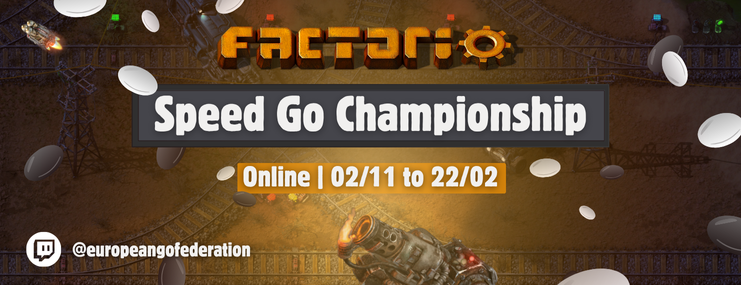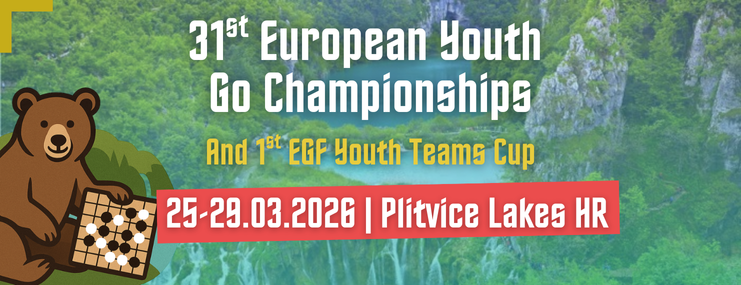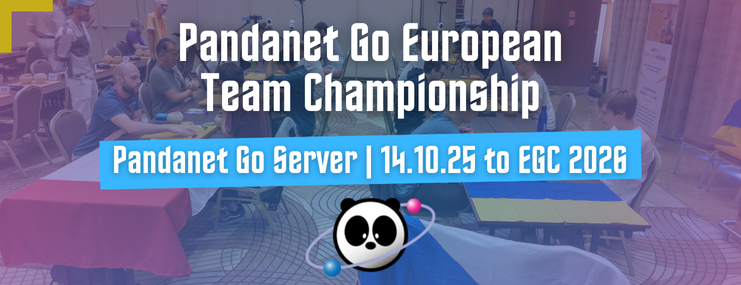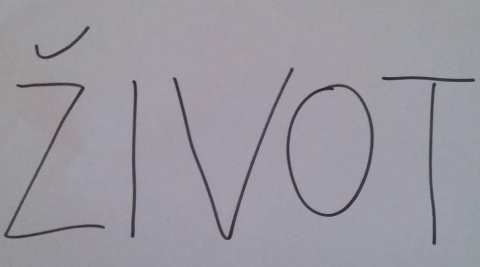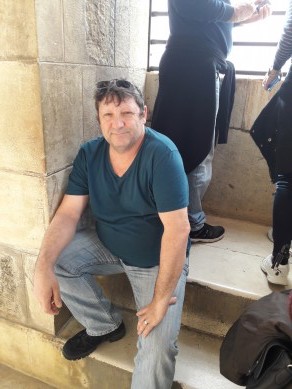I want to thank Lukáš for spending time with me for a teaching game and granting us this interview.
What can you tell us about your life as a go player.
Who introduced the game to you?
Who was your first teacher?
I learnt go at the age of 7 from my father. He used to play the game during his time at the university. He was searching for a nice family game, but he thought he wouldn't be a good teacher. Therefore he signed me up to Jana Hricova's course for children in Prague. His idea of it only being a nice family game got a bit out of control, because I started to improve very fast and I started to travel with my father to tournaments just one year later. I became a dan player at the age of 12 and soon after this a student of Vladimír Daněk. He helped me to reach the top Czech and European level. And the rest of my story is probably well-known.
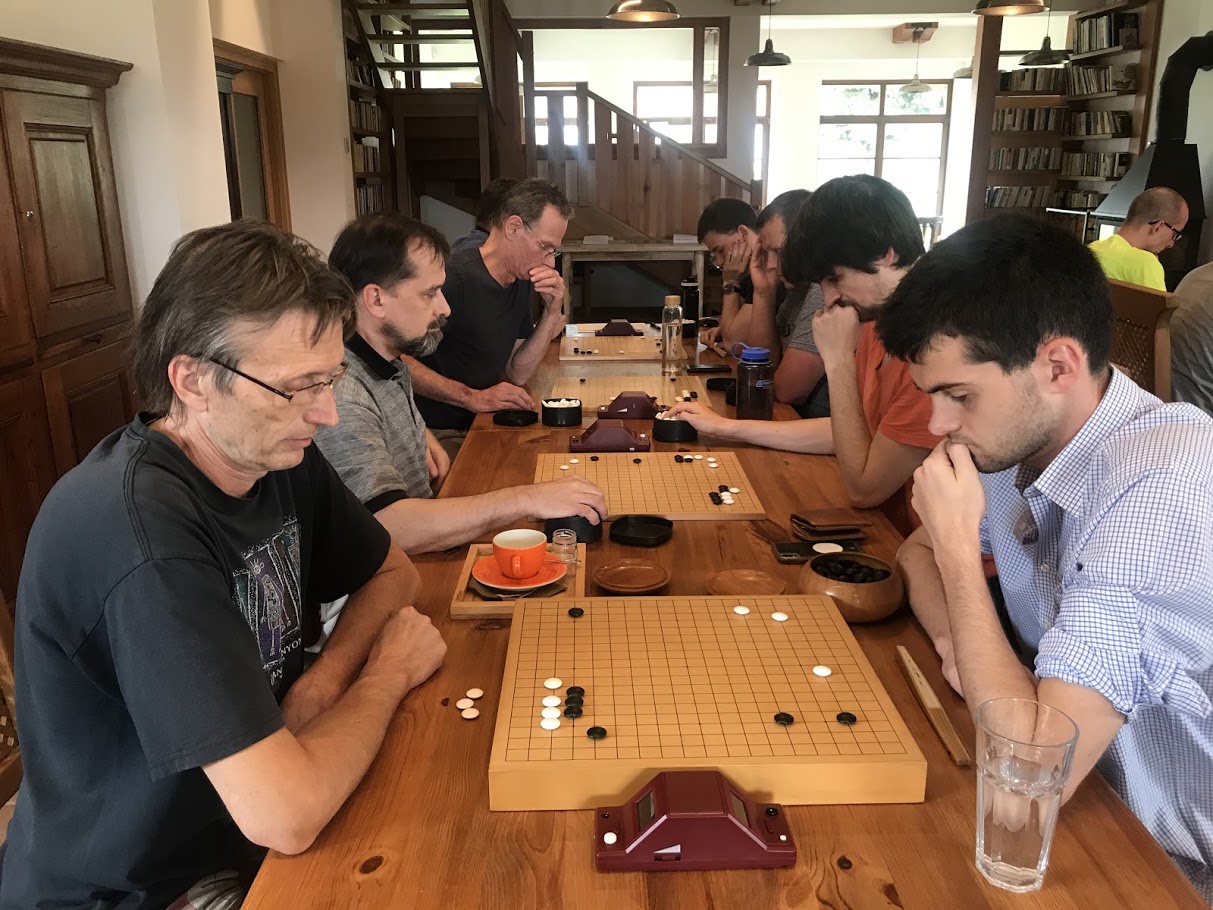
How many hours a day do you study go?
It's difficult to say. Since I'm a full time go teacher now, my schedule is very flexible and every week is different. However, I'm trying to find time for my own training as much as I can. There are days when I study from morning till evening. On the other hand there are some days when I don't study at all. So, if the answer should be how many hours a day I study on average, I would guess about 2 or 3.
Do you study a lot with Leela or some similar robot?
When Leela was released, I bought a new computer to be able to run it. At the start I was amazed by its strength and I spent really a lot of time with it. However, it's not the case these days anymore. I realized that it's much more important to develop my own human style. I definitely took some inspiration from Leela (and other AI), but recently I use it only to check my own games. Not really every move I analyze. It is more like I want to know, how I was doing during the whole game. Actually those famous percentages changed a lot my views on my positional judgment recently.
What would you describe as your most memorable game? Against whom did you play?
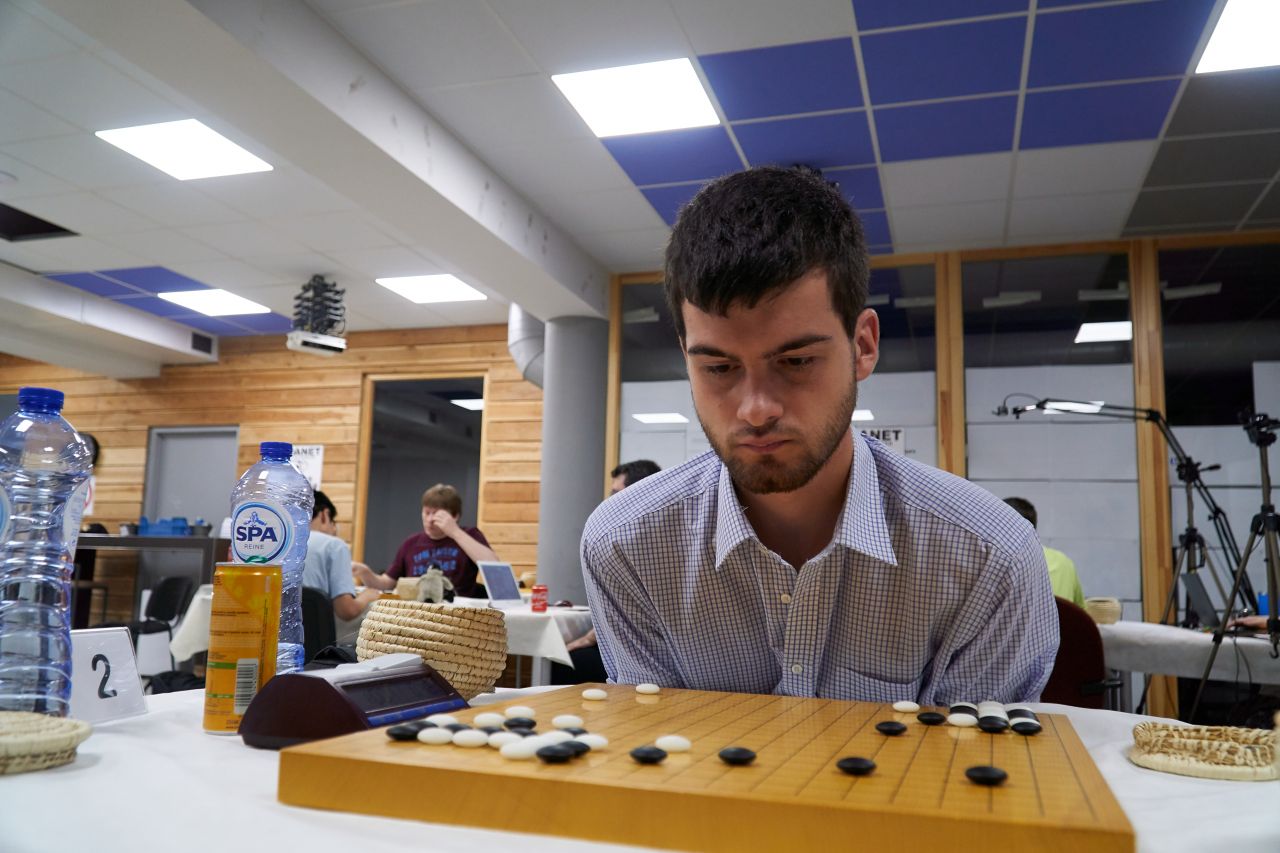
There are quite a lot of games I'm proud of. I got a bronze medal at the European Championship two times and during those tournaments I played almost only good games. However, if I should name one, it would probably be my quarter-final game from the 2019 EGC against Ali Jabarin, which I dominated from the start till the end.
Which (old) go master is your favorite player?
In one of the questions before I mentioned that Vladimir Danek was my teacher, when I was improving as a dan player. However, another important moment was when I got a book "Invincible" as a Christmas present, when I was 14. Replaying Shusaku's games changed me a lot and pushed my go to new heights.
So, I will not be very unique here, Shusaku is definitely my favorite old master.
Against which (old) master would you like to play a castle game?
I will probably answer with the same name. However, I would propose a time limit. I'm able to play a game during the whole day, but definitely not more.
If you could ask an (old) master one question whom would you like to ask a question and what would the question be?
I'm not sure if I have one specific question to ask. However, I was always wondering, how did the old masters hundreds years ago create their new ideas, what was their inspiration. The moves which we have been playing till now, some of them are very basic these days. In our age, we can ask AI for new inspiration. In the last century, there were various study groups of top professionals. However, I'm wondering how Shusaku for example developed his famous fuseki.
More information about the Shusaku opening, or Shusaku fuseki
What goals do you have as go player?
My dream has always been to become a professional player. I'm trying hard to make that come true, especially since the professional system was established in Europe. I have already reached the finals of the European Pro Qualification two times, so let's see if I can reach the third one this year and win it. If I succeed, then my goals would be probably the same as any other European professional player. Winning top European tournaments (European Championship, Grand Slam etc.). But most importantly I would really love to play in World tournaments regularly as well.
In one word what does Go mean to you?
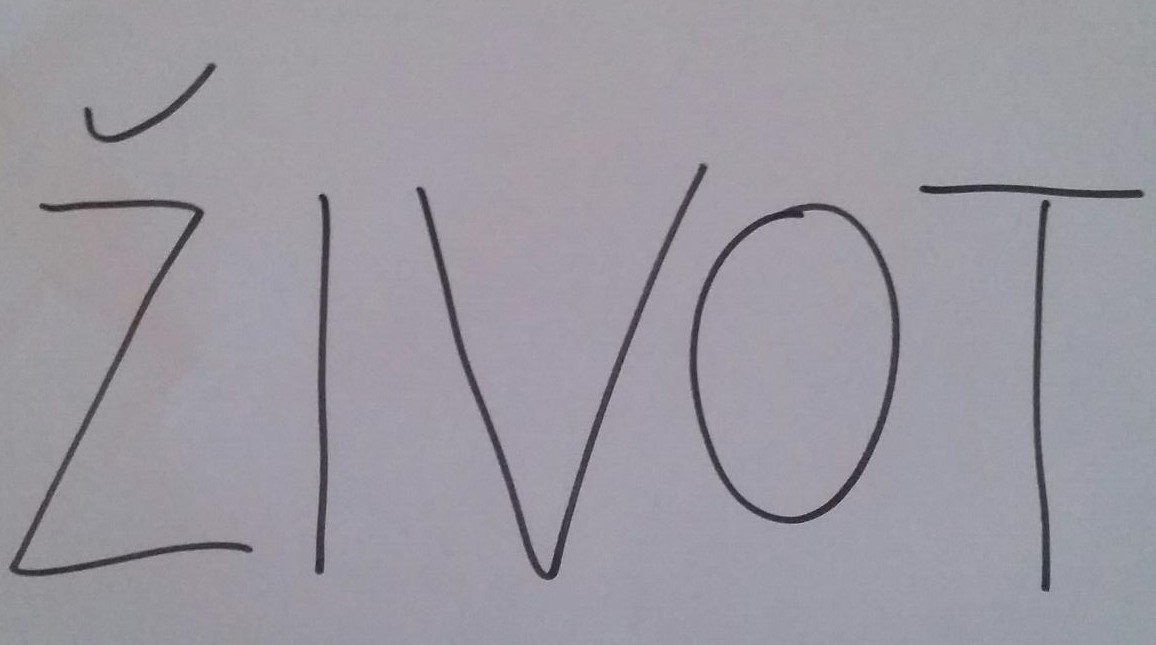
If you could ask yourself a question what would it be?
Damn, I really don't know what to ask myself. You said, you will probably send me some more questions, could you please include this one as well? :)
Part 2 of our interview was done during a friendly/teaching game we played on KGS.
Here follow a few of the comments from Lukáš, showing me how to keep a game simple and improve some basic techniques in the opening and early middle game.
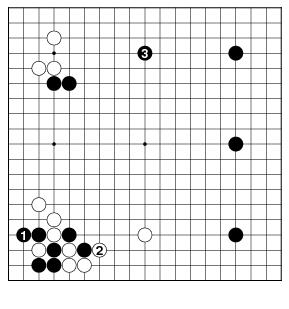
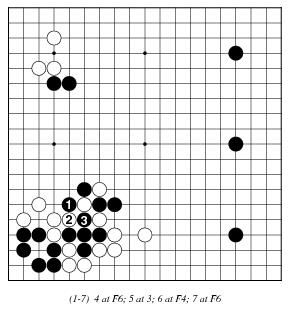
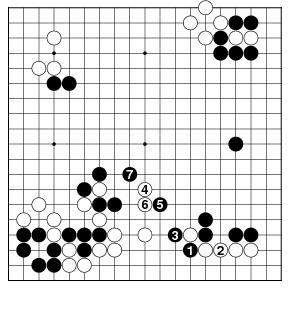
Black 23 is not good, it is better to continue as in diagram 1 keeping sente and leaving the two black stones as aji.
Black 37, starting with black 1 in diagram 2 forcing white to capture the black stones is better as there is no need to capture the white stone in a ladder after this sequence has been played.
Black 57, this creates a well known joseki which is outdated and old school. A lot better is to continue with 1 in diagram 3. Black 1 in diagram 1 instead of black 57 in the game is the modern way to play.
Do you remember the first time we met (when I remember it well 2016, Kido Cup, Adriana and you staying in my apartment)?
It was in 2016 Baden Baden Pro Qualification when we met for the first time and shook hands, although we must have seen each other on some occasions before.
Then I was invited to play in the Top 8 of the Kido Cup for the first time. After being close for some years being first or second reserve this was the chance I could not allo to pass me by. I was even able to get a more than reasonable result, winning 3 games. And yes, we met again, when my girlfriend Adriana and I were staying in your apartment.
I was scribe in the final you played against Tanguy in Strasbourg. From my point of view I saw a lot of emotions in your faces (yours as well as Tanguy) and body language during the game.
How was the game for you apart from losing the game?
Traveling with Adriana and Ondřej Kruml (who participated in the qualification as well) to Strasbourg was relaxing and I was in a good mood. The day before the I left I played football all day long to clean my mind.
Before the final match I was confident with Tanguy as my opponent, because I had very good results against him so far.
The game was going fine, although Tanguy managed to create a situation (with a lot of influence for me) which I do not prefer.
After a sequence where I made a probe but did not then play the strongest continuation afterwards I lost track of the game and the advantage I had had until then.
My concentration fell away and I did not play the endgame as strongly as I normally do.
In the end I lost by 3,5 points.
I was not so emotional during the game.
During the match from my point of view our faces were very calmly and showing no emotions.
However, I was not concentrated during the final part of the game anymore and after the game I felt bad, trying to keep my poker-face (keeping my emotions in grip).
I left before the prize-giving in Strasbourg, as I was too emotional and not able to face a lot of French players loudly celebrating the victory of Tanguy at that moment. Now I believe I am ready to become professional, even though a lot of strong players like Stanislaw will be looking for a chance as well.
During my return and in the first days at home I was very emotional about losing in the final game. In the end it took me maybe a month to fully recover from that.
Then the European Championship in Brussels came and I was not expecting a good result what with being quite unprepared and out of shape.
Even so I got very good results, coming 3rd in the championship and beating 3 professional players (including Tanguy) on the way, so I had a sort of revenge.
This gave me a lot of satisfaction and it made me realise that I can do a lot even when I am not a professional Go-player.
Playing online (even when you have a real opponent) is for me like playing against a bot.
I miss the interaction between players (Yoo Jung-Su, a strong Korean Go-Player once told me that the psychological part is also very important when playing).
How is this for you?
How do you try to hide emotion (keeping a poker face)?
Do you observe your opponent and look for reactions in face or body language?
As far as body language is concerned, I do not look a lot at my opponent during the game, except for some occasional view when I see a strange move is made, then I have a look at my opponent to see what is going on.
I mostly do not concentrate on my opponent, more on myself and the game I am playing,
placing my stones calmly, peacefully and silently on the board.
What is your opinion about online tournaments and the cheating possibilities?
This is a big issue! I was not so eager to play online tournaments up to 2020. I have only played in the Pandanet European Team Championship, Czech Teams League and German Bundesliga until then.
Once AI was available I got a camera just like all the other top players so that you can see your opponent during the game and have a good analysis after the match when you can have a better communication talking.
I record all of my official online games just in case there is a problem (as I have already had a game where I was accused of using AI), I was able to show the recording of me playing the game and so proved that I had not been cheating.
The main problem is that if you win against a stronger player most people will shout "cheating".
This problem with the bots and cheating has recently become like a cancer, growing very badly.
You have been coach/teacher in Jena International Go School several times.
What is your main drive to teach younger players (I am afraid to say young, as you are of course still young as well :)) ?
Lukáš can be found as a teacher in some places:
1. JIGS: https://www.go-jigs.eu/
2. Polgote.com: https://polgote.com/en/lukas-podpera
3. Nordic Go Dojo: https://www.nordicgodojo.eu/about/#teachers
4. KGS as Lukan (8d)
When the offer from JIGS came to me I was surprised as they have a very strong and well known teacher Kim Young-Sam 8d from Korea.
The offer was made because Young-Sam had to go back to Korea for 2 months.
Up to that moment I did not have a lot of teaching experience except for some teaching at the local Go-clubs, the Czech Go Camp and teaching in the Nordic Go Dojo (online school founded by Antti Törmänen and Su Yang).
So after some time thinking about this and discussing it with Adriana, I decided to take this opportunity and start a life as a full time go player and teacher.
I was not well known for my online teaching, unlike for instance the famous Cornel Burzo.
After I stopped my study at the university I decided to do what I was born for and started to teach more. Slowly increasing my amount of online students through personal contacts and the cooperation with JIGS, Polgote and NGD.
Teaching younger players (children are our future) is not that different from teaching older players.
My experience is that the main drive of a student should be to improve, in this I have been surprised by some older players and in the same time I was disappointed by some younger players.
Do not be afraid to say young players, because I am not a young player anymore. More like middle age now, being 26 years old.
How do you work with pupils (what and how do you teach)?
I mainly work with them on basic techniques as well as teaching them love for the game, and they need the urge to become stronger.
I do not want them to become a joseki encyclopedia, they should learn what their weakness are -
analyzing their weaknesses and then taking them out of there games and improving this way.
I am not a very strict teacher, even though I am direct and honest (a bad move is a bad move and not a little bit bad).
What would you say is most important to become a stronger player?
A desire to work hard, like go and spend a lot of time improving your weak points.
If you do not know where to improve, play a lot and study a lot of tsume-go.
Now, where teaching is done almost exclusively online, how is this for you?
Do you have a website or do you have a different way of finding pupils?
I do not have a personal website, most students I have either contacted me personally or came to me through promotion made by other students.
You can also find me as teacher via the links given in the introduction to these questions.
And I do some promotions on KGS and by using posters at tournaments.
Recently for example I did a commentary on the Polish Championship, that brought me a few Polish students.
I once played in the pair-go Tournament (Tuchola 1995) with a 20-kyu player we took 2nd place in the B-group which was a very good result seeing the strength of the other pairs.
What are the main challenges for you when playing as team (pair)?
I never had the challenge of playing in a team with a much weaker player than me.
When I started to play pair-go, it was with Adriana whom I met in 2014 and she was already 3-kyu at that time. And the challenges would not have been so big as with a 20-kyu player.
What is really important and a huge challenge, keep the pair-go out of the relationship.
Look for common grounds to play and try to keep the game simple.
We have had some successes, such as at the World Student Pair-Go Championship, beating some Japanese high-dan pairs for example.
Strangely we have never won the Czech Pair-Go Championship, as we have a lot of strong pairs (like Jan Hora and Klara Žaloudková), so a lot of times we managed to take 2nd place but we never did win the title. Winning the title is one of the goals we set as soon as real life tournaments can be played again.
Comming back to the question you could ask yourself:
How can I improve my qualities/strength as Go-player?
Focus on yourself and be honest in your game and the plans you set.
Do not try to cheat your opponent with overplay or trick moves.
If you hold yourself to honesty you are half way getting stronger and improving.
Maybe you even have a question for me :)
I am still your slave number 2 after Kido Cup 2018, right? It happened after I stayed in your apartment once again with other top European players and two Czech kids, who came with me. But I was always wondering how did Artem become your slave number 1?
This story started with a joke during the Winter Go Festival of 2018 in Vatra Dornei.
It was during the lunch break where I was fooling a little with my camera, making a life-video for facebook when Artem came in the restaurant and found his seat next to me.
I told him to smile and as a joke told him to say "I am your slave". He only believed after seeing the video it was live on Facebook. During the rest of the week the joke grew also with the help of his then wife to be. Now all this has grown so big that my new nickname is "Master".





